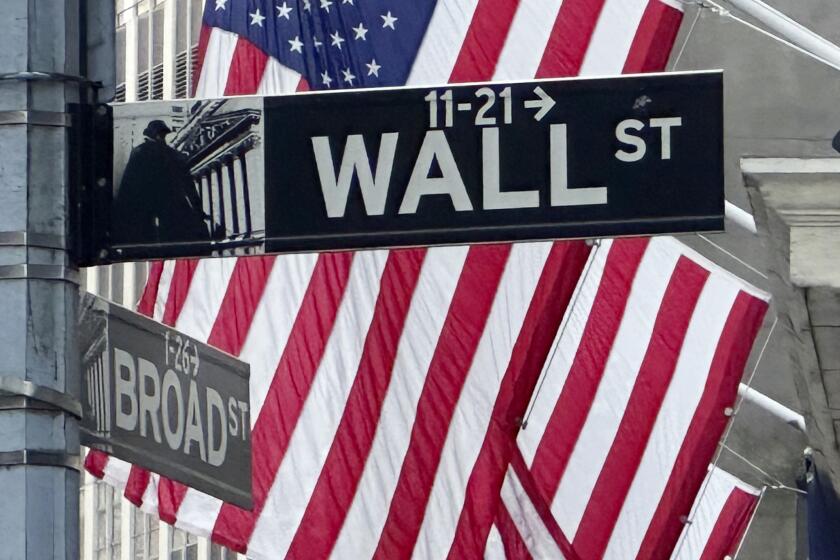Bail Denied for Stock Trader in Fraud Case
An Egyptian-born investor charged with inducing two FBI agents to join a stock scam was ordered held without bail Friday after a court hearing marked by heated debate over whether he had advance knowledge of the Sept. 11 terrorist attacks.
Assistant U.S. Atty. Ken Breen said Amr I. “Anthony” Elgindy, 34, called his broker Sept. 10 and told him to liquidate a $300,000 account held in trust for Elgindy’s children. In that conversation, according to Breen, Elgindy said the stock market would soon plunge.
“Perhaps Mr. Elgindy had pre-knowledge of the Sept. 11 attacks,” Breen told Magistrate John Houston in arguing against bail. “Instead of trying to report it, he tried to profit from it.”
Elgindy’s lawyer, Jeanne Knight, accused the prosecutor of using racial profiling to smear her client. She said the timing of Elgindy’s call to the broker was coincidental.
“This is just like the case of Wen Ho Lee where the government tried to charge someone with spying just because they are Chinese,” Knight said, referring to the former scientist at Los Alamos National Laboratory. “My client was being watched only because he is of Middle Eastern descent. This is scapegoating.”
Houston noted that none of the charges against Elgindy relate to the Sept. 11 attacks and said he would disregard Breen’s assertion. Houston said he was denying bail because Elgindy, by having ammunition at his home, violated his parole from an earlier conviction.
Elgindy, a colorful and controversial figure in the world of Internet stock trading, is charged with racketeering, fraud, extortion and obstruction of justice.
According to a federal indictment unveiled in New York on Wednesday, Elgindy and two associates conspired with two FBI agents to gain confidential investigative information that they used to attack the reputations of companies they targeted, hoping to drive down the stocks.
Elgindy disseminated the information on subscription-based and public Internet sites where he had gained a reputation as an aggressive and often prescient short seller--a stock-trading strategy in which the trader profits by betting that stock prices will decline.
Elgindy and fellow traders Derrick W. Cleveland and Troy Peters also allegedly used FBI material to extort payments from companies.
Former FBI agent Jeffrey A. Royer, who left the agency in December to join Elgindy’s investment firm, and Lynn Wingate, an Albuquerque-based FBI agent, face a federal court hearing in Brooklyn, N.Y., on Tuesday on racketeering, fraud and obstruction of justice charges.
Looking somber, Elgindy did not speak during Friday’s hearing. He was arrested Wednesday at his $2.2-million home in Encinitas, in northern San Diego County.
In arguing against bail, prosecutors said Elgindy is a flight risk. Breen noted that Elgindy wired large sums of money to Egypt and Lebanon in the days after Sept. 11. The transfers, from accounts in the U.S. and Canada, included the $300,000 from the children’s trust fund, plus $700,000 wired to Lebanon, prosecutors said.
Knight said the order to liquidate the children’s account came after the market had closed Sept. 10 and was not an “urgent” request as claimed by prosecutors. She also said the money sent to Lebanon was for a vacation condominium.
She said Elgindy, a U.S. citizen, had $2 million invested in the market in short positions at the time of the attacks. But prosecutors noted Elgindy stood to gain if the market dropped sharply.
In the days after Sept. 11, rumors swirled that terrorists may have profited by shorting insurance and airline stocks, which led the market’s plunge when it reopened after the attacks. Investigators haven’t been able to prove that such a scheme existed, and skeptics note that the market was falling in early September, providing a possible legitimate backdrop for short selling.
An extradition hearing was set for June 6. Knight declined to say whether Elgindy would fight extradition to New York.
Elgindy’s 14-year career in the securities industry has been marked by repeated clashes with market regulators and customers, including his own mother.
Chicago anesthesiologist Laila I. Gomaa brought an arbitration claim against her son in 1992, accusing him of making unauthorized trades in the pension account she kept at his securities firm, according to records from the National Assn. of Securities Dealers, where the dispute was filed. Gomaa was awarded $30,000.
NASD revoked Elgindy’s brokerage license in 1998.






